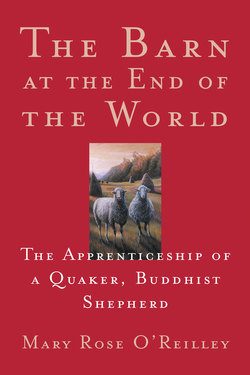Читать книгу The Barn at the End of the World - Mary Rose O'Reilley - Страница 19
На сайте Литреса книга снята с продажи.
ОглавлениеStopping for Coffee
I SELDOM THINK ABOUT how young Ben is, because he’s smart and competent and worries at the skill level of a forty-year-old. But he recently made a few days’ holiday of turning twenty-one and getting married to a girl he met in Future Farmers of America. She’s from a cattle family. Then, at the beginning of the week, he called me with a note of urgency in his voice: “I’m back! Come in and help me deworm.” I’m honored by this panicky call from the Real: to be valued as a common worker calms my spirit, agitated by too much abstraction. What Ben tells me daily, though not in words, and what the sheep tell me in their own language is, you are enough.
After our little hiatus, I relish the patient work with animals—patient, if not always perfectly skillful. Leaving the barn, I carry a sense of groundedness and practical focus that seems to improve even my driving. Tending sheep is a more symbiotic relationship than anything except perhaps motherhood. In some odd way I need these sheep to feel wholly myself.
We drenched about forty ewes and rams, quite large ones (eighty to three hundred pounds). I discovered that if I managed them in a small pen, I could control them easily (this being another operation where you sometimes have to sit on them). Drenching is an alternate deworming procedure; you suspend the vermifuge like an IV and slide the nozzle of the drench gun, which resembles a caulking gun, along the animal’s tongue and insert it deep in its throat. Unpleasant as it sounds, the sheep don’t seem to mind this much and it’s a quick procedure. One squirt and off they go. It was relatively easy, and I proudly drenched most of the flock on my own while Ben went about his business.
Then I cleaned the shit off my pink high-tops and drove home, stopping for an espresso at the coffeehouse across from the college. Men and women were hunched over copies of Jean Paul Sartre and writing in their journals. Most wore the thin-rimmed tortoiseshell glasses favored by intellectuals. Their clothes were faded to a precisely fashionable degree: you can buy them that way from catalogs now, new clothes processed to look old. The intellectuals looked at me in my overalls the way such people inevitably look at farmers.
I dumped a lot of sugar in my espresso and sipped it delicately at a corner table near the door. I looked at them the way farmers look at intellectuals.
